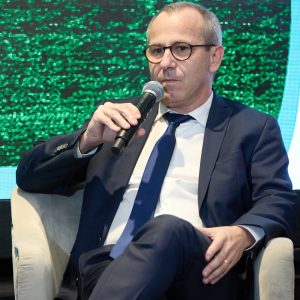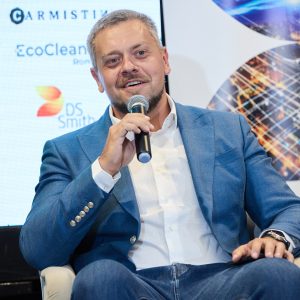The last panel of the first day of the Environmental & Sustainability Summit 2023, “Sustainable Urban Development” brought together specialists from the real estate, construction, urban mobility and cleaning industry.
For a sustainable and clean future in urban agglomerations, all agreed that we need to accelerate the decarbonisation and efficiency of production and construction processes, as well as the adoption of innovations in all economic sectors.
Dan Adrian Chelaru, Group Sustainability Officer, Iulius

”It is important to realise that sustainability means responsibility, and that means taking on the challenges facing society, and how we do our work will affect us all. I come from the real estate area and I would like to raise a red flag, especially on the construction area, which needs a change in the way we do business. We need to change our focus from the profit area and focus on the area of adding value to communities. These things bring long-term competitive benefits. If we talk about sustainable urban developments, I would like to mention that Iulius is a developer of mixed urban regeneration projects with more than 25 years of experience in the field.
Sustainability is not only about the environment, it also has an economic impact. Our portfolio exceeds 1.2 billion euros, with over 300,000 sqm of retail space, over 240,000 sqm of office space, we have attracted over 80 multinationals that have generated around 25,000 jobs. All this has an indirect impact on local taxes, but it also has a direct impact on the quality of life of people in the community.
We build projects responsibly and based on sustainability, with long-term benefits. We are trying to revitalize undervalued areas in the centres of big cities and beyond. As Group Sustainability Officer, my job is complex, but simplified by the fact that all our projects are built around sustainability. We have investments in the community of over 190 million euro, Iulus Town Timisoara is an example of this, we have investments in infrastructure, public gardens, in public buildings given to the community and parking. They all include public gardens, which have become focal points in the community. Our entire portfolio of projects is Green certified, which ensures a high level of sustainability.
On the energy efficiency side, we have projects to introduce photovoltaic panels wherever possible. In general, 10% of our own consumption is produced in-house. Decarbonisation is a hot topic, a responsibility we have to take on. The Iulius Group signed a partnership with the World Bank, with the IFC, at the end of last year to support us in developing a decarbonisation strategy to achieve European climate neutrality targets. The project will start early next year.”
Mark Thompson, Managing Director, EcoClean FM Romania

”In the past decade, the cleaning industry has undergone a remarkable transformation, placing great emphasis on sustainability for both consumers and companies. The use of harsh chemicals is no longer desirable, although there are instances where their use remains necessary for the removal of certain substances. Nevertheless, in the majority of cases, water-based methods such as e-water systems and microfibre technology prove to be sufficient for their elimination. Take, for instance, the cleaning of outdoor spaces or fixed infrastructures, which previously required the heavy use of detergents to eradicate stubborn stains. However, thanks to the development of simpler alternatives like pressure washers equipped with task-specific nozzles, these stains can now be removed without the need for chemicals.
As the trend for constructing green buildings, offices, and co-working spaces continues to grow, it is essential to seamlessly integrate and adhere to green practices. However, the incorrect usage of many green cleaning products remains prevalent due to a lack of training and education. It is crucial, therefore, to maintain ongoing conversations and actively educate stakeholders about the available solutions in order to secure a brighter and more sustainable future.”
Andreea Ciobanu, Chief Marketing Officer, Hagag Development Europe

”For us, sustainability in the residential sector, and within our projects, is about buildings that answer to present needs without affecting the needs of future generations. Projects that are designed and built to have as little impact on the environment as possible, that encourage the economic development of the cities they are built in, and that contribute to the development of sustainable communities. When a developer completes and delivers a project, he also lays the foundation of a new community. But Hagag is not just an investor-developer, it also manages the projects it delivers. This is how we make sure that our buildings stay healthy and sustainable over time. We offer Facility Management services for our residential projects as well – which is not something common in Romania. But we do this so that the communities we have contributed to, become sustainable and transcend time.
In addition, we have been focusing our attention on urban regeneration projects through the conversion of old buildings, which is a niche segment with little to no history in Romania. We believe that urban regeneration starts from the city Centre and goes towards its extremities, that is why we decided to invest in Calea Victoriei and Piata Universitatii in Bucharest. So far, we managed to give back to the city three old buildings. Three buildings that, when acquired, had seismic risk 1 or 2, and that we consolidated, renovated, and modernized, making them as sustainable as possible. For future projects, in addition to Bucharest, we are also looking closely to Western cities like Timisoara and Cluj.
Sustainability is not only our responsibility, as developers, or the responsibility of the business environment. From our point of view, in order to have a tangible result, the local authorities and the people, too, need to pay more attention to the choices they make.”
Edmund Piess, Sustainability Director, Holcim

”The Holcim Group in Romania does not only produce cement. Concrete is just one end product, we have a wider range of building materials. Talking about decarbonisation, we need to understand first of all what it means. Today, we have a problem with climate change, with global warming. At the same time there is an imbalance in the atmosphere, we have too much CO2. And as long as we produce too much CO2 we will have a greenhouse effect. Decarbonisation means finding solutions to stop producing so much CO2. One of the biggest problems globally is population growth and therefore consumption, which leads to more and more carbon dioxide.
If we talk about the construction industry, it contributes 7% of global carbon emissions, not a huge amount, but we can control these emissions. And talking about the trend of urban concentration and smart cities, we think about people’s comfort. This is where the contribution of building material manufacturers is very big through the products we have. Concrete is the second most consumed product today after water, we cannot build or live without concrete in the future either.
Holcim contributes to decarbonisation through the products we have improved and the programmes we have. We also prioritize affordable houses, i.e. buildings that more people can afford, and in France we made the first building with recycled materials, part of a program where we build only with recycled materials. By the way, I don’t know how many people know this, but concrete is a 100% recyclable material.”
Alexandru Vasiliu, Sales and Marketing Director, E-Mobility Rentals

“E-Mobility has an innovative solution for urban mobility, we have fleets of electric vehicles and mopeds that run on universal interchangeable batteries, which you can swap in swap-stations already installed all over Bucharest. The basic idea is that you don’t have to wait for the car to charge and it takes 30 seconds to swap an empty battery. We already have 10 stations installed in Bucharest, located within 2 km of each other and we will have 20 by the end of the year. Currently, 100 e-Mobility Rentals cars are being serviced by these ten stations. Through our mobile app you can see which is the nearest station and how many batteries are available, and when you get there the reserved slot opens and you can immediately change the empty battery for a charged one.
We have a partnership with Kaufland that allows us to place our swap stations in their parking lots, and a pilot partnership with Glovo that uses our electric vehicles for deliveries. The data we have collected during this pilot show us over 100,000 clean km, 40 tons of CO2 saved and an average 75-80 decibels per car neutralized. And numbers keep multiplying.”


:quality(80)/business-review.eu/wp-content/uploads/2023/10/Small_NEAN0434.jpg)

:quality(80)/business-review.eu/wp-content/uploads/2024/07/vodafone-RO.jpg)



:quality(80)/business-review.eu/wp-content/uploads/2024/06/22C0420_006.jpg)

:quality(80)/business-review.eu/wp-content/uploads/2024/06/COVER-1-4.jpg)



:quality(80)/business-review.eu/wp-content/uploads/2024/06/br-june-2.jpg)
:quality(50)/business-review.eu/wp-content/uploads/2024/07/BeFunky-collage-37-scaled.jpg)
:quality(50)/business-review.eu/wp-content/uploads/2024/07/04_ThinkPad_T14s_6_Business_Coworking.jpg)
:quality(50)/business-review.eu/wp-content/uploads/2024/07/Iulia-Surugiu-scaled.jpg)